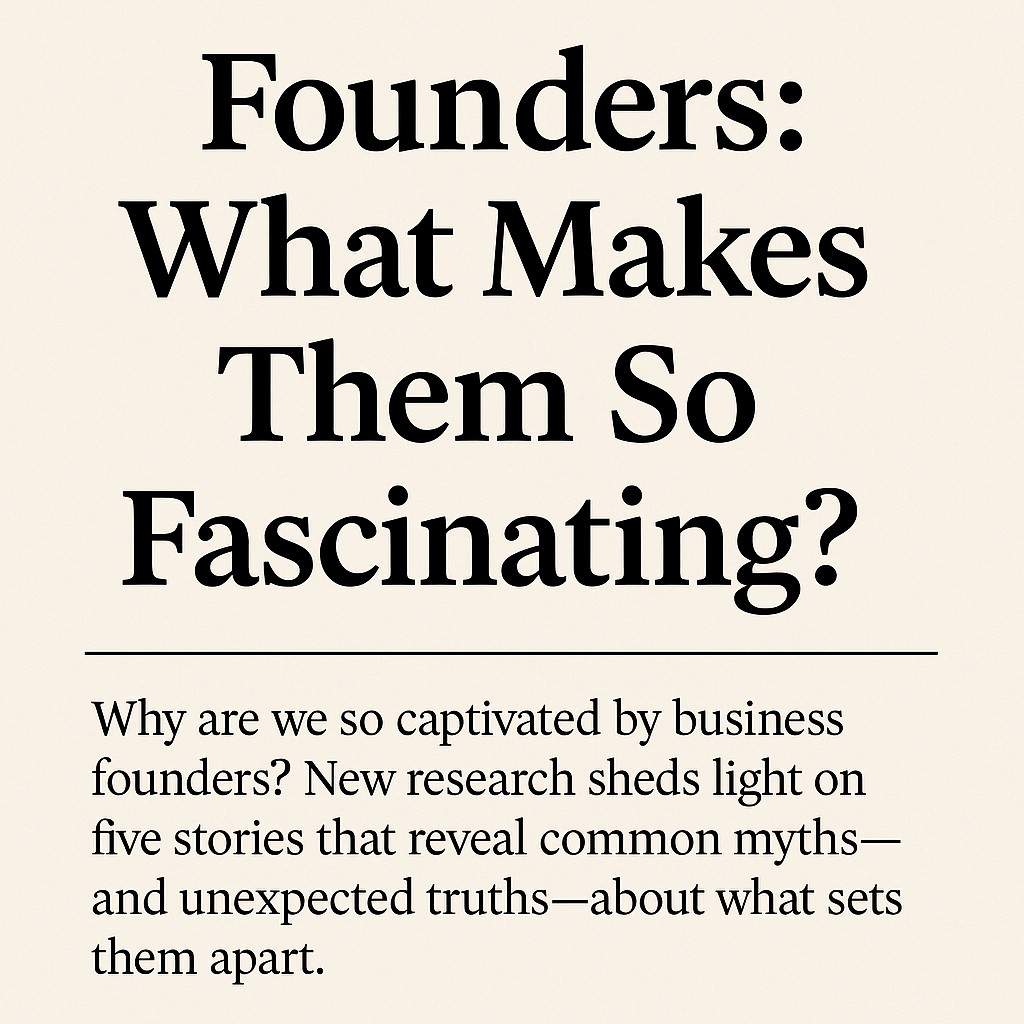Founders: What Makes Them So Fascinating?
June 24, 2025
Why are we so captivated by business founders? In the U.S., there's an enduring fascination with the people who disrupt industries, build billion-dollar companies, and shape how we live, shop, and even think. What exactly sets these individuals apart? Is it visionary thinking, relentless drive, or unconventional habits like cold showers and meditation? Founders live in a cultural spotlight that blends guru, celebrity, futurist—and sometimes comic-book villain.

Think Jeff Bezos, Elon Musk, Mark Zuckerberg. Their influence reshapes everything from shopping and internet behavior to currencies and elections. But it's not just a Western phenomenon anymore. Founders from India like Nikhil Kamath (Zerodha), Byju Raveendran (BYJU'S), Falguni Nayar (Nykaa), and Naveen Tewari (InMobi) have carved out massive global influence, scaling from Indian soil to global relevance. Each embodies a new generation of leaders rewriting the rules of entrepreneurship.
These myths and stories about founders shape who gets capital, who gets mentored, and who gets spotlighted. But as new research and recent biographies reveal, many of our assumptions about successful entrepreneurs are simply wrong—or at least incomplete.
5 Books That Challenge Founder Myths :-
1. Amazon Unbound:
Jeff Bezos and the Invention of a Global Empire – Brad Stone This book explores how Bezos evolved Amazon from an online bookstore to a life-altering tech giant. His leadership principles, obsession with scale and efficiency, and cultural imprint inside Amazon are dissected in detail—sometimes praised, sometimes critiqued.
2. The Cult of We:
WeWork, Adam Neumann, and the Great Startup Delusion – Eliot Brown & Maureen Farrell This is a crash course in what happens when charisma overtakes business fundamentals. Neumann sold a mundane office rental business as a world-changing idea. Investors believed the hype—until it all collapsed.
3. Tencent:
The Extraordinary Story of a Chinese Internet Enterprise – Wu Xiaobo Pony Ma, co-founder of Tencent, took a very different approach. Far from the media spotlight, Ma focused on strategic agility and product minimalism. His company now controls everything from WeChat to e-commerce, payments, and gaming in China.
4. Super Founders:
What Data Reveals About Billion-Dollar Startups – Ali Tamaseb Tamaseb set out to test the myths using hard data. He studied over 200 unicorns and found wide variation: most founders were in their mid-30s, had prior work experience, and did not always come from elite institutions. His key takeaway: there is no fixed recipe.
- The New Builders: Face to Face with the True Future of Business – Seth Levine & Elizabeth MacBride This book redirects the spotlight toward the overlooked majority—especially women, minorities, and older founders—who are building impactful businesses in their communities. In India, stories like Falguni Nayar’s late-career leap into beauty retail with Nykaa, or Richa Kar’s journey with Zivame reflect similar dynamics.
The Indian Angle: Redefining Global Entrepreneurship
The rise of Indian founders in the global startup narrative has been remarkable.
Nikhil Kamath revolutionized retail investing with Zerodha and now drives the conversation on new-age wealth.
Falguni Nayar, who founded Nykaa at 49, became India’s richest self-made woman, defying age and gender stereotypes.
Bhavish Aggarwal, co-founder of Ola, is now venturing into electric mobility with Ola Electric.
Naveen Tewari’s InMobi became India’s first unicorn before the term even went mainstream.
Ghazal Alagh (Mamaearth) and Shradha Sharma (YourStory) are also breaking barriers as impactful women founders in a traditionally male-dominated ecosystem.
Their stories show that the founder archetype is evolving—no longer just a white, hoodie-wearing Ivy Leaguer, but anyone with grit, vision, and the ability to adapt.
There’s value in studying success stories. But we must separate myth from insight. Obsessing over a narrow stereotype of the "ideal founder" may cause us to overlook transformative talent. As founders from India and other underrepresented regions continue to rise, the definition of entrepreneurial genius is expanding—and that’s a good thing.
Related Posts
Get in touch with us
We are just a phone call away from you.
Feel free to call us anytime or write to us on our email id. We are always available to solve your queries.




